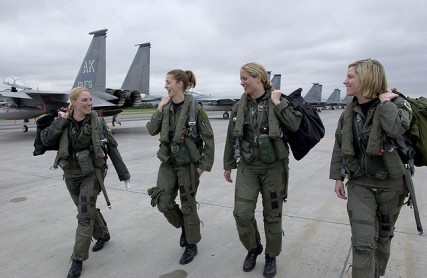
I wanted to join because I have a passionate viewpoint on patriotism and serving my country. Being a female, I wanted to tackle a male-dominant career. I wanted to feel pride, as well as receive financial assistance in my college endeavors.
My boyfriend is in the Army Reserves and went on one tour to Afghanistan in 2011. I have many friends from home who have gone into the military and are either active duty or in the reserves today, and I am also friends with my boyfriend’s military buddies.
Growing up around military men and being around my boyfriend and his military friends today makes me wonder what it would be like in combat. I wonder if I would be able to handle the harsh reality of war or be able to pull the trigger and take another human’s life.
I could never truly understand or comprehend what these veterans must deal with, and I’m not sure if I would necessarily want to. No one can truly know what it is like until they have experienced it for themselves.
I can, however, observe the aftermath of war on the people I love.
In the book I am reading in my social justice class, “Soul Repair: Recovering from Moral Injury after War,” by Rita Nakashima Brock and Gabriella Lettini, they state that “the journey home to peace is perilous after war” due to a veteran’s emotional wounds called “moral injury.”
Moral injury is the violation of core moral beliefs, and though these injuries do not inflict physical scars or blood, they are open wounds that veterans must struggle with for the rest of their lives. Moral injury could occur by doing, seeing or even not stopping something that goes against a person’s moral beliefs.
Moral injury is different than PTSD, and people may have moral injury without PTSD. PTSD is a response to severe trauma in which hormones are released that affect responses to fear, emotions and connections from fear to memory. People who have PTSD are triggered by a noise or image that takes them back to their traumatic experience, and sufferers may experience flashbacks, nightmares, hyper vigilance, and dissociation. The memory of a past trauma “erupts uncontrollably and retraumatizes the sufferer,” which leaves them feeling hopeless and terrified.
Based on my friends, loved ones, and everyone who I have ever known to go to combat and see action, moral injury (in most cases combined with PTSD) is the consequence. Veterans join the military with good intentions, and then pay the price of war with open emotional wounds.
When the majority of civilians are in favor of the war, veterans are heroes. But once people are no longer supportive of the war, they tend to not understand why veterans chose to be a part of the military in the first place, which intensifies the veteran’s guilt and moral injury. People stop trying to relate and empathize with the veterans who were fighting for their freedom.
I believe that all Americans who are anti-war should remain 100 percent supportive of our troops. The men and women who are serving and trying to protect our freedom are not the “bad guys” in the injustices of war. Blame should be placed on the people as a whole and on the government officials whom we have elected. People should be more informed on the moral injuries that our veterans must deal with on a daily basis. Everyone should try to make our veterans feel loved and supported.
We should stand beside our brothers and sisters who suffered for us in war, and continue to suffer even after they return home.
Megan Spano is a blogger for ColumbiaFAVS.com.







